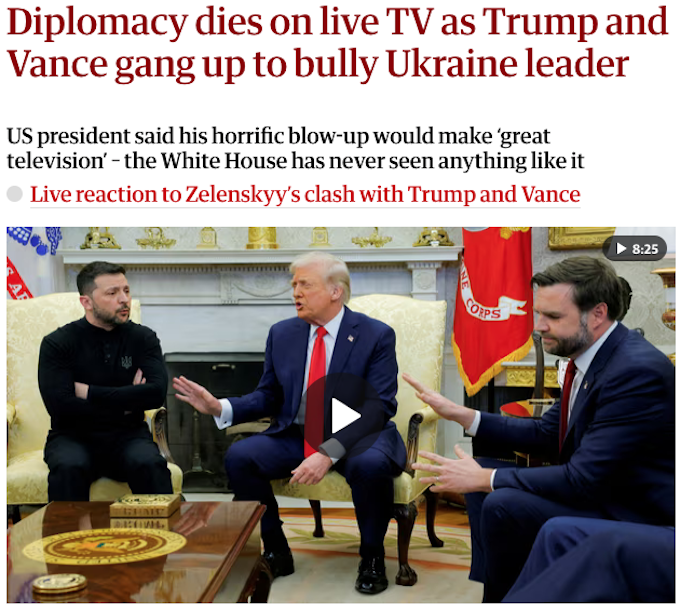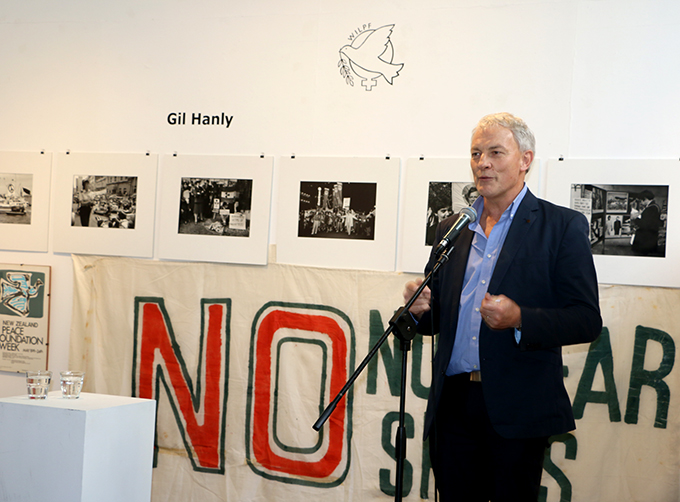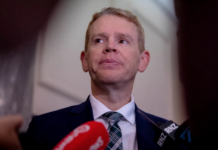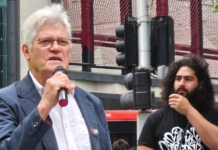
Now that Phil Goff has ended his term as New Zealand’s High Commissioner to the UK, he is officially free to speak his mind on the damage he believes the Trump Administration is doing to the world. He has started with these comments he made on the betrayal of Ukraine by the new Administration.
By Phil Goff
Like many others, I was appalled and astounded by the dishonest comments made about the situation in Ukraine by the Trump Administration.
As one untruthful statement followed another like something out of a George Orwell novel, I increasingly felt that the lies needed to be called out.
I found it bizarre to hear President Trump publicly label Ukraine’s leader Volodymyr Zelenskyy a dictator. Everyone knew that Zelenskyy had been democratically elected and while Trump claimed his support in the polls had fallen to 4 percent it was pointed out that his actual support was around 57 percent.
- READ MORE: Explainer: What was actually wrong with what Phil Goff said?
- ‘We need to stand up for what is right’ — Phil Goff doesn’t regret Trump comments

Trump made no similar remarks or criticism of Russia’s Vladimir Putin and never does. Yet Putin’s regime imprisons and murders his opponents and suppresses democratic rights in Russia.
Then Trump made the patently false accusation that Ukraine started the war with Russia. How could he make such a claim when the world had witnessed Russia as the aggressor which invaded its smaller neighbour, killing thousands of civilians, committing war crimes and destroying cities and infrastructure?
That President Trump could lie so blatantly is perhaps explained by his taking offence at Zelenskyy’s refusal to comply with unreasonable and self-serving demands such as ceding control of Ukraine’s mineral wealth to the US. What was also clear was that Trump was intent on pressuring Ukraine to capitulate to Russian demands for a one sided “peace settlement” which would result in neither a fair nor sustainable peace.
It is astonishing that the US voted with Russia and North Korea in the United Nations against Ukraine and in opposition to the views of democratic countries the US is normally aligned with, including New Zealand.
Withdrew satellite imaging
It then withdrew satellite imaging services Ukraine needed for its self defence in an attempt to further pressure Zelenskyy to agree to a ceasefire. No equivalent pressure has yet been placed on Russia even while it has continued its illegal attacks on Ukraine.
Trump and Vance’s disgraceful bullying of Zelenskyy in the White House as he struggled in his third language to explain the plight of his nation was as remarkable as it was appalling.
What Trump was doing and saying was wrong and a betrayal of Ukraine’s struggle to defend its freedom and nationhood.
Democratic leaders around the world knew his comments to be unfair and untrue, yet few countries have dared to criticise Trump for making them.
Like the Hans Christian Anderson fairy tale, everyone knew that the emperor had no clothes but were fearful of the consequences of speaking out to tell the truth.
As New Zealand’s High Commissioner to the UK, I had on a number of occasions met and talked with Ukrainian soldiers being trained by New Zealanders in Britain. It was an emotionally intense experience knowing that many of the men I met with would soon face death on the front line defending their country’s freedom and nationhood.
They were extremely grateful of New Zealand’s unwavering support. Yet the Trump Administration seemed to care little for that country’s cause and sacrifice in defending the values that a few months earlier had seemed so important to the United States.
The diplomatic community in London privately shared their dismay at Trump’s treatment of Ukraine. The spouse of one of my High Commissioner colleagues who had been a teacher drew a parallel with what she had witnessed in the playground. The bully would abuse a victim while all the other kids looked on and were too intimidated to intervene. The majority thus became the enablers of the bully’s actions.
Silence condoning Trump
By saying nothing, New Zealand — and many other countries — was effectively condoning and being complicit in what Trump was doing.
It was in this context, at the Chatham House meeting, that I asked a serious and important question about whether President Trump understood the lessons of history. It was a question on the minds of many. I framed it using language that was reasonable.
The lesson of history, going back to the Munich Conference in 1938, when British Prime Minister Chamberlain and his French counterpart Daladier ceded the Sudetenland part of Czechoslovakia to Hitler, was clear.
Far from satisfying or placating an aggressor, appeasement only increases their demands. That’s always the case with bullies. They respect strength, not weakness.
Czechoslovakia could have been part of the Allied defence against Hitler’s expansionism but instead it and the Czech armaments industry was passed over to Hitler. He went on to take over the rest of Czechoslovakia and then invaded Poland.
As Churchill told Chamberlain, “You had the choice between dishonour and war. You chose dishonour and you will have war.”
The question needed to be asked because Trump was using talking points which followed closely those used by the Kremlin itself and was clearly setting out to appease and favour Russia.
A career diplomat, trained as a public servant to be cautious, might have not have asked it. I was appointed, with bipartisan support, not as a career diplomat but on the basis of political experience including nine years as Foreign, Trade and Defence Minister.
Question central to validity, ethics
“The question is central to the validity as well as the ethics of the United States’ approach to Ukraine. It is also a question that trusted allies, who have made sacrifices for and with each other over the past century, have a right and duty to ask.
The New Zealand Foreign Minister’s response was that the question did not reflect the view of New Zealand’s Government and that asking it made my position as High Commissioner untenable.
The minister had the prerogative to take the action he did and I am not complaining about that for one moment. For my part, I do not regret asking the question which thanks to the minister’s response subsequently received international attention.
Over the decades New Zealand has earned the respect of the world, from allies and opponents alike, for honestly standing up for the values our country holds dear. The things we are proudest of as a nation in the positions we have taken internationally include our role as one of the founding states of the United Nations in promoting a rules-based international system including our opposition to powerful states exercising a veto.
They include opposing apartheid in South Africa and French nuclear testing in the Pacific. We did not abandon our nuclear free policy to US pressure.
In wars and in peacekeeping we have been there when it counted and have made sacrifices disproportionate to our size.
We have never been afraid to challenge aggressors or to ask questions of our allies. In asking a question about President Trump’s position on Ukraine I am content that my actions will be on the right side of history.
Phil Goff, CNZM, is a New Zealand retired politician and former diplomat. He served as leader of the Labour Party and leader of the Opposition between 11 November 2008 and 13 December 2011. Goff was elected mayor of Auckland in 2016, and served two terms, before retiring in 2022. In 2023, he took up a diplomatic post as High Commissioner of New Zealand to the United Kingdom, which he held until last month when he was sacked by Foreign Minister Winston Peters over his “untenable” comments.












































